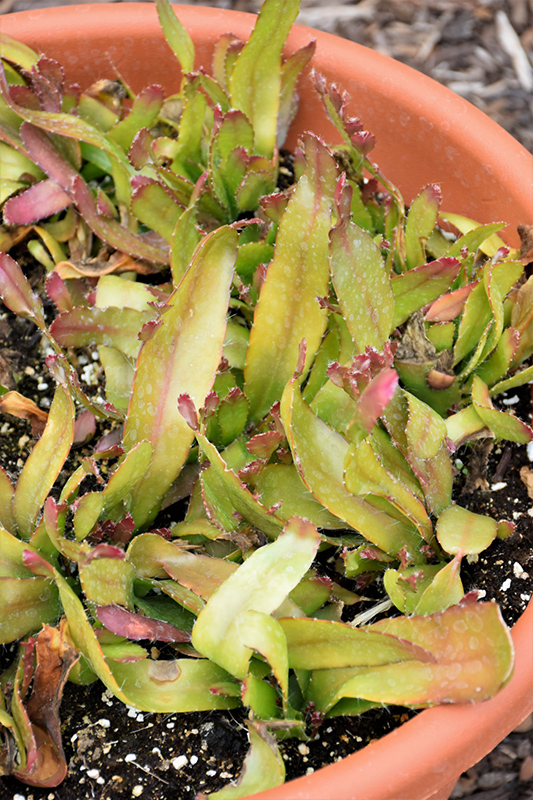Height: 16 inches
Spread: 5 feet
Sunlight:
![]()
![]()
Other Names: Red Mistletoe Cactus, Pseudoriphsalis ramulosa
Description:
A free branching variety that produces flat chartreuse-green stems that turn bright violet-red in full sun; small flowers give way to small white shell berries that dot the foliage; a great hanging basket plant that thrives indoors
Features & Attributes
Red Rhipsalis is a small succulent evergreen plant. It is an atypical member of the cactus family known as an 'epiphyte' or 'air plant', which means that it doesn't necessarily require a growing medium for its roots. Like all other cacti, it doesn't actually have leaves, but rather modified succulent stems that comprise the bulk of the plant. This particular variety of cactus is valued for its characteristically trailing and weeping form on a plant consisting of
Planting & Growing
When grown indoors, Red Rhipsalis can be expected to grow to be about 16 inches tall at maturity, with a spread of 5 feet. It grows at a slow rate, and under ideal conditions can be expected to live for approximately 30 years. This houseplant will do well in a location that gets either direct or indirect sunlight, although it will usually require a more brightly-lit environment than what artificial indoor lighting alone can provide. This is a unique plant in that it requires extremely dry, well-drained soil, and it will die if left in standing water for any length of time - in fact it will suffer if it is over-watered. The soil should be allowed to go completely dry to the touch an inch or two deep for prolonged periods, and it may only need watering once every few weeks. Be aware that your particular watering schedule may vary depending on its location in the room, the pot size, plant size and other conditions; if in doubt, ask one of our experts in the store for advice. Like most succulents and cacti, it prefers to grow in poor soils and should therefore never be fertilized. It is not particular as to soil type or pH; an average potting soil should work just fine.
There are many factors that will affect the ultimate height, spread and overall performance of a plant when grown indoors; among them, the size of the pot it's growing in, the amount of light it receives, watering frequency, the pruning regimen and repotting schedule. Use the information described here as a guideline only; individual performance can and will vary. Please contact the store to speak with one of our experts if you are interested in further details concerning recommendations on pot size, watering, pruning, repotting, etc.
-- THIS IS A HOUSEPLANT AND IS NOT MEANT TO SURVIVE THE WINTER OUTDOORS IN OUR CLIMATE --

